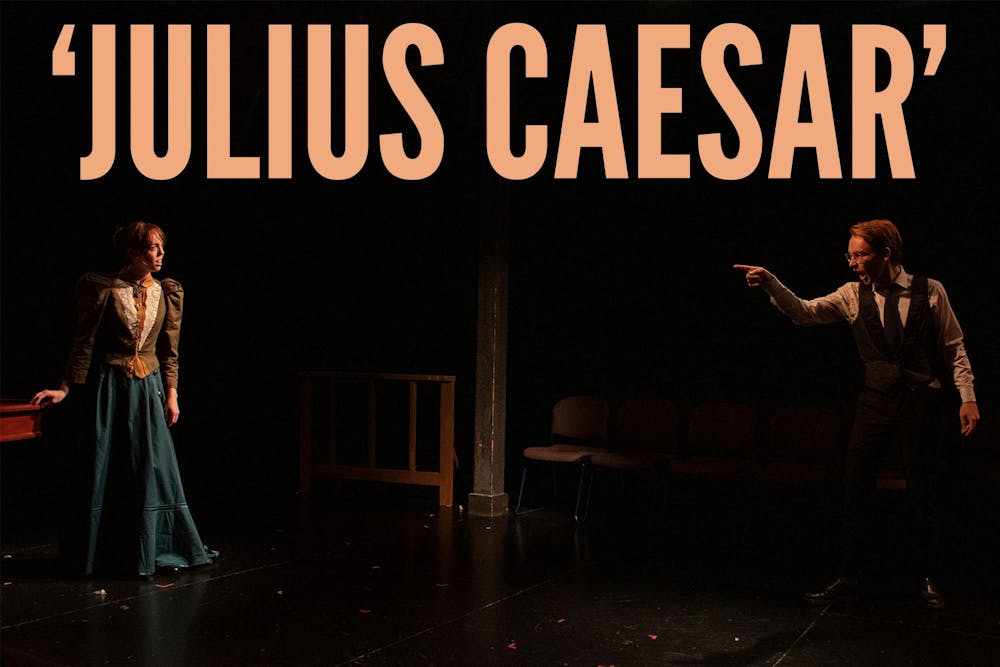“No, this was he, Messala, / But Cassius is no more. O setting sun, / As in thy red rays thou dost sink to night, / So in his red blood Cassius’ day is set. / The sun of Rome is set. Our day is gone; / Clouds, dews, and dangers come; our deeds are done.”
The Trump campaign — and then the four years of his presidency — spawned a brood of “Julius Caesar” productions which heavy-handedly casted the play’s Antony and Caesar as Republican-coded demagogues and its Brutus and Cassius as valorant “#Resist” liberals. I dreaded these productions, because it flattens a genius work of drama and poetry into a political fable — the dramatic equivalent of a “Just So” story.
When the Not-So-Royal Shakespeare Co. (NSR) — Notre Dame’s premier, and only, student Shakespeare group — announced that their main fall production would be a suffragette-themed “Julius Caesar,” I was nervous. It isn’t that I don’t like ballsy Shakespeare adaptations. Ian McKellen’s Nazi-themed “Richard III” is great, and I love Baz Luhrmann’s notorious “Romeo + Juliet.” Orson Welles’s voodoo take on “Macbeth” sits well with me too. They all add a lot of color to the text of each of their respective plays. My fear was just that NSR’s suffragette “Julius Caesar” would be an awkward, forced redux of the Trump productions repackaged for the era of Kamala Harris’s Democratic Party rather than Hillary Clinton’s.
Fortunately for me and everyone who goes to see NSR’s production — playing at Washington Hall’s Lab Theatre from Wednesday, Nov. 13 through Friday, Nov. 15 as well as Sunday, Nov. 17 — director Ryan Palmer doesn’t cheapen “Julius Caesar” with his suffragette staging. Rather, he succeeds in highlighting what’s already interesting about Shakespeare’s script.
At first, the amendations Palmer had to make to the script are a little jarring — e.g., “Mend me, thou saucy fellow” is swapped with “Mend me, thou saucy lass.” Eventually, though, you don’t notice them.
The most striking switch, of course, is “Julia Caesar” for “Julius Caesar.” I was expecting Caesar to be played either as a Kamala type in the name of “staying current” (which would have risked turning the tragedy into a farce) or as a Margaret Thatcher character (because that would be a convenient way to reconcile the female casting with the role’s bold writing).
As Julia, actress Alyssa Miulli falls for neither of these traps. Surprisingly and wisely, she strikes a tone somewhat reminiscent of the one Amy Poehler used to use for Leslie Knope’s more serious scenes in “Parks and Recreation.” The performance is low-key and suits her well, helping her role — which marks the most blatant departure from Shakespeare’s vision of the play — feel like something natural rather than like an imposition.
The real stars of the show, though, are Brutus and Cassius; they do have several times more lines than the titular character, after all. Actor Will Barrett’s Brutus is explicitly brooding and temperamental. Actress Caroline Long’s Cassius, however, is suspiciously poised and has a feigned politeness about her. While Brutus’s frequent outbursts are impressive feats of acting, whenever Cassius’s mask starts to slip and she begins to raise her voice, it’s genuinely terrifying.
Actor Andrew Arcidiacono nails the infamous “Friends, Romans, countrymen” oration as Antony. Whereas Brutus delivers his lines the way a politician would — sometimes even slipping into the iconic Obama cadence — Antony speaks to the crowd as a friend to a dear friend.
Brutus, Cassius and Antony — who dominate the play — all feel ambiguously wicked; there aren’t really any heroes to root for, just villains of varying levels of audience appeal. My personal favorite was Cassius, who has a great voice — a unique mix of a little low and a little quiet — and a knack for striking a balance between natural and poetic delivery. The refusal to bend “Julius Caesar” into a play which names clear good guys and obvious bad guys saves it from the pitfalls of those Trump era productions I couldn’t stand.
A lot of the performances from the supporting cast serve to add to this gloomy, mixed-up atmosphere. Actress Mary Adams is good as Portia, the long-suffering wife of Brutus. Actress Madison Denchfield is Brutus’s naive servant, and her innocent demeanor makes the emotional turmoil her character undergoes in the final act all the more tragic. Actress Francie Surdyke’s brief appearance as Titinius, a close friend of Cassius, was remarkably heartfelt and an unexpected highlight of the show.
Furthermore, the group of conspirators are a colorful cast of characters in themselves. Actor Jacob Rush’s Decius Brutus is convincingly suave and manipulative. In the assassination scene, actor Ayden Kowalski’s genuinely hopeful and enthusiastic Cinna provides a nice foil to the scheming Cassius’s reaction.
Actor Tommy Liddy’s choice to give the conspirator Casca an Italian-American accent straight out of “The Sopranos” was inspired — and a reminder that, even when performing a tragedy, humor is one of NSR’s strong suits. (Still, he was able to get serious when his lines demanded it.) The production’s sometimes campy, sometimes harrowing dance sequences choreographed by Cecilia Swartz and actor Andy Ottone’s portrayal of the tragicomic death of Cinna the Poet were two other examples of NSR’s knack for dark humor.
Overall, however, NSR played “Julius Caesar” a lot straighter than they did “Richard III” last semester, which really leaned into the breakneck switches between gags and murders. While in general I prefer this sort of NSR production — their way of performing the tragedies with a good sense of humor and the comedies with lots of attention to detail — I can’t complain about the more serious NSR on display in this “Julius Caesar.”










